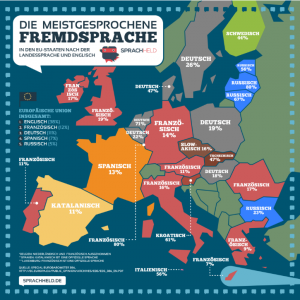Native German speakers also make mistakes
They put the verb in wrong position when using it in “weil”-sentences. The solution is simple: they should use “denn” instead of “weil”. This is a good advice for the learners too.
This is a common mistake in spoken language among German native speakers. No German would make this mistake in written. Researchers Gerard Kempen und Karin Harbusch have analysed talks of 1000 adults and filtered causal clauses out. They found out that in 34 % cases – the verb was in the wrong position, in 39 % in the correct position and 27 % used “denn” or “da” insted of “weil” which prevented them from making the mistake. The main reason for this is that speakers do not have enough time to plan the sentence ahead or they just don’t know how the sentence will end. The researchers of the Max Plank Institut say that normally speakers make the decision to add a causal sentence too late which why they do not have enough time to build it correctly. In order to avoid this mistake, researches advise that you try using “denn” instead of “weil”.
Source: Max-Planck-Institut für Psycholinguistik
18 different ways to say “Geld” in German
Kohle (coal), Mäuse (mice), Knete (dough), Kröten (frogs), Kies (grit), Moos (moss), Marie, Zaster, Flöhe (fleas), Pinkepinke (cha-ching), Pulver (powder), Lappen (rags), Piepen, Koks, Schotter (broken rocks), Rubel, Riesen (giants), Flocken (flakes). For detailed explanations click here.
*******************************************************
German is the 3. most spoken foreign language in the EU
English is the most spoken foreign language in the EU, while French is on the 2. place and German in on the 3. place:
- English (38 %)
- French (12 %)
- German (11 %)
- Spanish (7 %)
- Russian (5 %)
German is the most spoken language after English in: Poland, Sweden, Belgium, Netherlands, Denmark and Hungary (gray area on the bellow map -> click on the map to see it better).
***********************************
“Huawahoasi!!” (= auf BayrischIch: “ich heiße Hueber”)
Sometimes we write “ue” instead of “ü” when we want to avoid using Umlaut (for example, if we are using English keyboard). However, the last name “Hueber” which is the name of the large German publishing house whose text books for learning German we all use, should be pronounced as “Huber”. An anecdote about this can be read here.
***********************************
American “super speller” need to know German words
“Gesellschaft” (“companionship” or “society”) was one of the two winning words in this year’s National Spelling Bee in America which was held on May 26, 2016. The winning words spelled by each contestant were “Gesellschaft “and “Feldenkrais”. Of course, “Gesellschaft“ is a word which was borrowed directly from the German. This is not the first time that one German word appeared in the final round of this competition. Previously that were: “Ursprache”, “Weltschmerz” and “Heiligenschein”.
***********************************
5 German verbs (Source: sprachheld.de)
You don’t have to know the foreign language perfectly in order to use it in a conversation. You don’t even have to know every word. You actually need 5 verbs in order to communicate in German: sein, müssen, wollen, können and machen: Was machst du? Ich mache gerne Sport. Ich bin Arzt. Wie ist es in Deutschland? Ich bin gerade Suppe essen. Read more about it here.
***********************************
How do we learn?
10 % through the formal material provided in classes; 70 % through interaction with other people; 20 % in informal learning contexts.
***********************************
German language in numbers
132 million people are native German speakers, while 14,5 millions learn German as a foreign language across the globe.
Here are some statistical data for you to get the whole picture:
Native speakers:
- Chinese: 1, 39 billion people
- Hindi-Urdu: 588 million people
- English: 527 million people
- Arabian: 467 million people
- Spanish: 389 million people
- Bengali: 250 million people
- Russian: 254 million people
- Portuguese: 193 million people
- German: 132 million people
- Japanese: 123 million people
- French: 118 million people
- Italian: 67 million people
Learners across the globe:
- English: 1,5 billion people
- French: 82 million people
- Chinese: 30 million people
- German: 14, 5 million people
- Spanish: 14, 5 million people
- italian: 8 million people
- Japanese: 3 million people
Sources: Ulrich Ammon, University of Düsseldorf; Population Reference Bureau
*********************************
14 ways to say “hard work” in German
You can say “hard work” in German in 14 different ways: ackern, sich abplagen, sich abarbeiten, ein hartes Stück Arbeit, im Akkord arbeiten, Knochenarbeit, malochen, Rackerei, Schufterei, schweißtreibende Arbeit, Strapaze, Stress, Überbelastung, große Beanspruchung




